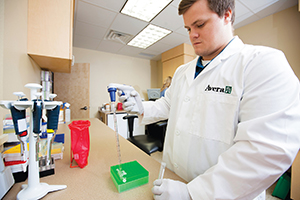By BETSY TAYLOR
When Carol Hofman took a personalized medicine test showing her how her body metabolized medications, she initially had no idea just how helpful the results would be.
The 62-year-old's primary care doctor asked last year if she wanted to take a new test, developed by the Avera Institute for Human Genetics in Sioux Falls, the South Dakota city where the Avera Health system is headquartered. Opened in 2006, the institute is a molecular genetics laboratory. It has about 30 Avera employees associated with it. They are engaged in research projects and clinical work, such as exploring the best ways to test and treat patients using precision medicine, tailored to the individual.

Carol Hofman benefits from personalized medicine testing through Avera Health in South Dakota that allows her doctors to tailor her medications to her. She's shown here with four of her grandchildren.
One area of the institute's focus is pharmacogenomics, the study of an individual's DNA to understand how the body will metabolize medication. Hofman's physician, Dr. Carilyn Van Kalsbeek, a family practitioner with Avera Medical Group, worked at a clinic that in late 2016 piloted the GeneFolio test developed by the institute. The test gives information about how each individual patient might respond to a wide variety of medications. Since 2017, nearly 1,500 patients have been tested using GeneFolio.

Van Kalsbeek
Van Kalsbeek asked patients to consider the test if they had complicated medical histories and were prescribed multiple medications, or if they'd reported that a medication hadn't seemed to work well for them or had too many side effects. Hofman was taking medication to treat hypothyroidism and high cholesterol. She said the test results showed some medications she shouldn't use in combination.
Hofman's GeneFolio profile became an important part of her electronic medical record when she unexpectedly learned she had Stage 3 kidney disease later last year and had to be hospitalized. Doctors used Hofman's personalized medication test results to prescribe combinations of drugs for her, and to adjust her dosages.
"It's no longer, 'we'll try this, we'll try this,'" Hofman said. "They know what's best for me."
Red light, green light
Krista Bohlen, the director of personalized pharmaceutical medicine for the Avera Institute for Human Genetics, said the system's current pharmacogenomics testing has its roots in a study that began in the fall of 2013. Avera began testing patients having orthopedic surgery. It then went on to offer the test more broadly in 2014, with a blood draw sent to the Avera Institute for Human Genetic to determine how each person metabolized pain medications. From there, the system began conducting pharmacogenomic testing on some patients experiencing chronic pain who weren't getting relief from their pain medications and tests on select patients prior to inpatient surgery.

Bohlen
"Think of it as a chemical snapshot" of an individual, Bohlen said. Currently, using a saliva or blood sample, the institute's lab assesses multiple genes from the individual's DNA that affect how the person's liver and kidneys metabolize blood thinners and medications used to treat pain, depression, high cholesterol and other conditions.
The laboratory generates a written consultation that sets out the way an individual is expected to metabolize specific drugs using red, yellow and green shading to indicate levels of concern. A report for a patient having surgery can be generated in one day; results usually come back in one to two weeks for patients giving a DNA sample during an office visit.

An Avera Health employee at work in one of the Sioux Falls, S.D.-based health care system's labs.
Van Kalsbeek explained that the report shows which medications a patient is likely to metabolize more effectively with fewer side effects. The testing also determines if a person metabolizes medications at a normal, rapid or slow rate. This information can affect dosing or the medications prescribed.
Gareth Davies, chief scientific officer for the Avera Institute for Human Genetics, said most patients pay $179 out-of-pocket for the GeneFolio test. A presurgical pharmacogenomic test can be ordered in advance or rolled into overall surgery costs for inpatient procedures. To date about 7,000 patients have had pharmacogenomics testing through Avera.
Pinpointing psychiatric medications
The institute's work related to psychiatric medications is stirring public interest. Bohlen said when putting a patient on a new psychotropic medication, trial and error frequently comes into play. It's not uncommon for a doctor to ask the patient whether any first-degree relative had taken the drug and whether it worked for them.
Psychiatrists may prescribe a medication and then follow up with the patient a few weeks later to determine if it's working. The pharmacogenomics testing results and the results of other tests related to serotonin and other important mental health pathways are helping doctors to hone in on which antidepressants, for instance, have an increased chance for success and decreased risk of adverse effects.

Davies
Davies said reducing trial and error with medications improves patient outcomes and lowers costs. "The most important thing is the patient's welfare," he said.
Van Kalsbeek says the GeneFolio results are actionable. She gave the example of a patient whose post-knee replacement pain medication caused such severe vomiting the patient said she didn't think she'd get her other knee replaced as planned. Van Kalsbeek said the pharmacogenomic test results helped her identify a better pain medication for the patient, who then went ahead with the second procedure and reported a much smoother recovery.
Van Kalsbeek said she anticipates pharmacogenomic tests will become more common. "It's been developed; it's very usable; it's part of our medical records; it's been very helpful," she said.
In March, the La Palma, Calif.-based Innovation Institute, a for-profit with health system member owners including Avera Health, said it and 2bPrecise, which is a subsidiary of Allscripts Healthcare Solutions, entered into an agreement to enable GeneFolio to be used by providers at other Innovation Institute health systems.
|
Avera Health to enroll patients in personalized lung cancer trial
Avera Health has begun a study in conjunction with an international collaboration to improve first-line treatment for patients with metastatic non-small cell lung cancer.
Avera Health explained in a statement that researchers will examine DNA sequencing and RNA expression levels in patients' normal tissue and tumor tissue to help guide care in a new clinical trial.
Patients in the Survival Prolongation by Rationale Innovative Genomics trial will be given a three-drug protocol that incorporates avelumab, an immunotherapy drug, with two other targeted therapies, palbociclib and axitinib. The three-drug combination is expected to block multiple cancer pathways.
The clinical trial is a collaboration between Avera Health and other members of the Worldwide Innovative Networking Consortium.
The trial opened in January at Avera Health and expanded to other centers in April.
A total of about 30 to 50 patients enrolled through six study centers will participate in the first phase of the trial, which is expected to last about a year, according to Dr. Benjamin Solomon, the medical oncologist who is the lead investigator for the study at Avera Health. The first phase will explore the safety of the drug combinations and determine optimal dosing. Phase two of the trial will involve 100 to 200 patients. It will explore the efficacy of the tri-therapy regimen as a first-line treatment for metastatic non-small cell lung cancer, according to a statement from Avera Health.

Solomon
The consortium has developed an algorithm, which it hypothesizes can identify optimal personalized therapies for cancer patients. The statement from Avera Health says other collaborative clinical trials may be developed to pair other lung cancer genomic abnormalities with drug combinations to determine what works best.
"Most lung cancers harbor detectable genomic changes, some of which already have associated well-established treatment approaches," Solomon said. "This is an exciting area of research, which has led to a significant change in treatment options over the last decade for patients with lung cancer."
Fondation ARC, a French funding organization, provided a research grant for the trial with drugs supplied by Pfizer, according to Solomon.
— BETSY TAYLOR
|
Copyright © 2018 by the Catholic Health Association
of the United States
For reprint permission, contact Betty Crosby or call (314) 253-3490.